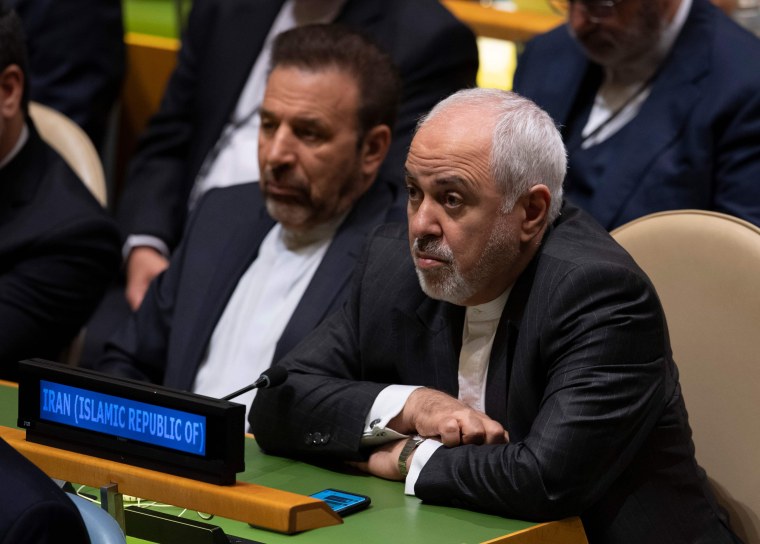Iran criticized the United States Saturday for what it called an "inhumane" decision to bar Foreign Minister Mohammad Javad Zarif from visiting one of its diplomats at a hospital in New York.
The State Department said Zarif, who is in the city for the United Nations General Assembly, could only visit the diplomat if Iran frees an American citizen.
On Saturday Iran's Deputy Foreign Minister Abbas Araghchi told the country's official IRNA news agency that the U.S. has taken humanitarian issues "hostage" for political causes.
The U.S. restricted Zarif's movement in New York to just six blocks, preventing him from reaching Tehran's U.N. ambassador Majid Takht Ravanchi, who has been undergoing cancer treatment.
"Foreign Minister Zarif would like to visit a colleague who is in the hospital receiving world class care," a State Department spokesperson told NBC News Saturday.
"Iran has wrongfully detained several U.S. citizens for years, to the pain of their families and friends they cannot freely visit. We have relayed to the Iranian mission that the travel request will be granted if Iran releases a U.S. citizen."
There are at least four Americans currently imprisoned in Iran. Human rights groups and U.N. monitors say the detentions are arbitrary and baseless.
But Iranian President Hassan Rouhani has said that it’s America’s turn to release an Iranian citizen after his country released Lebanese and permanent U.S. resident Nizar Zakka in June.
President Donald Trump has instead clamped down on travel restrictions for Iranians coming to the U.S. while blaming the country for threatening peace and stability in the Middle East.
On Wednesday he ordered a visa ban on senior Iranian government officials and their family members, blocking them from entering to travel, study or work.
The travel dispute comes after discussions for Iranian officials to meet with Trump during the U.N. summit failed to materialize. Both sides cited U.S. sanctions against Iran as a point of tension, preventing a meeting.
Trump claimed Friday that Iran had wanted him to lift the sanctions as a condition to meet. "I said, of course, NO!" he said on Twitter.
Relations between Washington and Tehran have been increasingly strained in recent weeks.
The U.S. accused Iran of being behind attacks on Saudi Arabian oil fields two weeks ago, prompting Zarif to promise "all-out war" in the event of any military strike against his country.
In his address to the U.N. on Wednesday, Iran's President Hassan Rouhani accused the United States of "merciless economic terrorism" for its sanctions, which Trump pledged to "substantially increase" amid renewed tensions in the Arabian peninsula.



